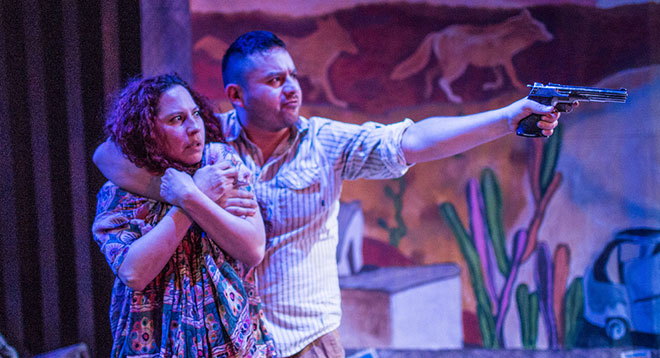Play brings audience together over border divisions

Immigration—one of the most powerful, emotional and divisive issues of our time—was the controversial subject of the bilingual play Cuentame Coyote, performed by the Milagro Theatre Group on campus Feb. 25. Framed from the viewpoint of two cousins seeking to flee Mexico for a better life in the United States, this powerful and emotional play takes an uncompromising look at the difficulties many illegal immigrants face when trying to cross the border.
“It was really good,” student Anthony Vander Velden said. “It explains most of the history that a lot of the people go through and how they have to deal with the deaths of their loved ones. I’ve got a lot of family that have had to deal with that before. It was pretty good.”
In the play, the two cousins –Maria (played by Alida Holguin Wilson-Gunn) and Jose (played by Ajai Terrazas-Tripathi, originally from Corvallis) – decide to seek out a new life in the U.S. when Maria becomes pregnant with her lecherous boss’s child. During the journey, they encounter two different varieties of “coyote”: the spiritual, trickster-spirit and the corrupt human variety in the guise of a smuggler (both roles played by Erubiel Valladares Carranza.)
Judging by the reactions of multiple audience members, the play clearly struck an emotional nerve from the very beginning. Some people wept, more than once, while other audience members seemed to enjoy the humor. There was also a great deal of tension, especially during the scenes of violence.
“I think they did a very good job portraying the violence as well as they could, given the situation,” Spanish instructor Nick Tratz said. “Certainly there are some stereotypes presented as well – the stereotypical American person . . . that’s out there with her gun in the desert. Obviously that is not everybody along the border because there are people that are doing good as well.”
Student Rebecca Foster also enjoyed the play. Although she was born in Roseburg, she was raised in Mexico and has dual citizenship. Having lived in both countries has given her a unique perspective on the subject of immigration.

“I liked the play in the sense it really related the situation that people actually go through because it is really easy to separate yourself from that situation,” Foster said. “It’s unfortunate that one of the easier ways to get people to relate to things is to use stereotypes, and I think there are other ways of approaching the issue that aren’t just reforming American law. There are a lot of things that should be done in Mexico, from the side of Mexico’s government.”
The play had a powerful effect on Foster, as it did on others in the audience.
“Emotionally, I would say that it is really easy for me and for people that I know who aren’t very close to the border to just think that situation is so far from us that we just don’t really relate to it that much. I was really emotional because of the death,” Foster said.
However, not everyone who watched the play came away with a positive impression. Student Dan Nelson felt the play was going in too many different directions and that the use of profanity was unwarranted.
“It seemed like two different plays happening simultaneously. Half was about the border, half was about weird pagan stuff. There was no need for the profanity. Throwing in the profanity didn’t gain you anything, it didn’t do anything else except make it all edgy. The two minute dance with death wasn’t explained, like what that was all about, what was going on, they just danced around for awhile. I felt kind of creeped out.”
After the play, in a Q&A session with the actors, a man who formerly lived in Arizona spontaneously told his story of discovering the bones of an immigrant who had perished in the desert, and how he later spoke to the family of the deceased. This audience member had a tough look about him – bearded, big, serious, Harley Davidson shirt. And then he shattered that stereotype with an emotional, soft story of the impact of finding the remains of a life. When actor Wilson-Gunn explained that an estimated 60 percent of migrants attempting to cross the border died en route, the room grew quiet.
